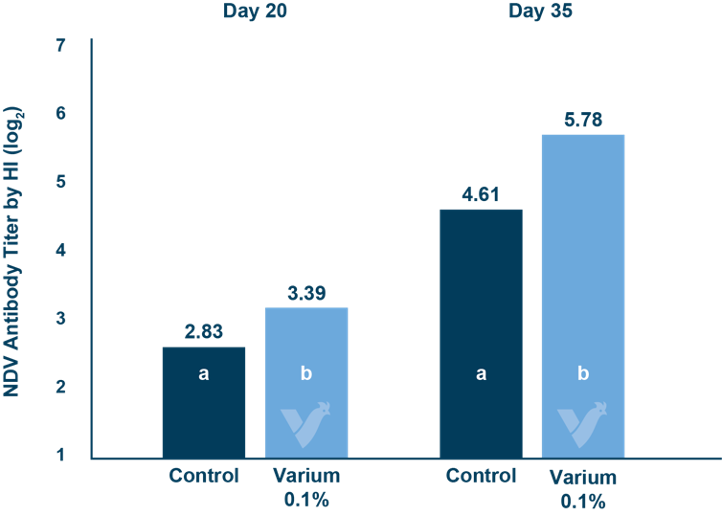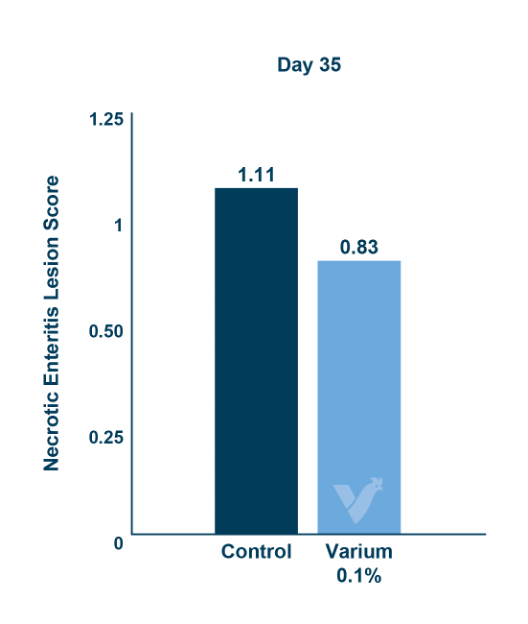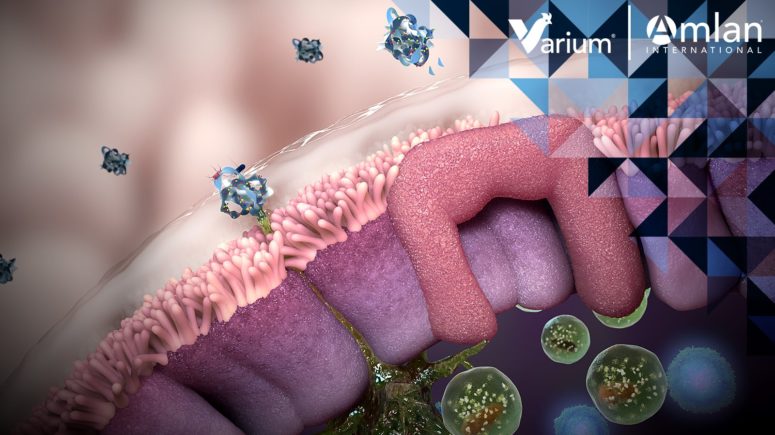Protecting gut health, maximizing feed efficiency and increasing growth rates in poultry has traditionally been achieved with antibiotic growth promoters (AGPs). But with the rise of antibiotic-resistant bacteria and consumer demand for antibiotic-free (ABF) protein, the worldwide poultry industry is migrating toward ABF production systems. Poultry producers today need viable, profitable and natural alternatives to AGPs that can help maintain gut health, support efficient feed use and promote growth.
Varium® is a natural performance additive that enhances multiple aspects of the intestinal environment, creating production results consistent with those observed with AGP use. In the intestinal lumen, Varium reduces levels of pathogenic bacteria and their toxins, protecting the intestinal lining from attack. Varium also acts an enterocyte energy source, fostering healthy and strong enterocytes that can better absorb nutrients and support growth. Additionally, Varium stimulates the innate immune system to help birds naturally defend against pathogens. Continue reading to view the research demonstrating the beneficial effects Varium has on poultry immunity and intestinal integrity.
Improved Immune Competence
Birds with a healthy gut have a competent immune system that responds appropriately and is less susceptible to disease-causing bacteria and viruses. In a study conducted with Salmonella-challenged broilers at Imunova Análises Biológicas (Curitiba, Brazil), Varium helped restore immune competence and ultimately favored the development of appropriate defenses against the pathogen. The improved immune competence was demonstrated by the apparent prevention of cytotoxic T cell terminal activation (CD8+CD28– phenotype) which, when it occurs in large numbers, can render the immune system less responsive and competent in fighting against pathogen infections. Varium also restored major histocompatibility complex class II (MHC II) expression, essential for the stimulation of an antigen‑specific immune response, and increased monocyte phagocytic activity compared to the Salmonella-challenged control group. For further details of this study, contact Amlan (info@amlan.com).
Responsive to Immune System Stimuli
The ability of the immune system to prevent pathogens from establishing a successful infection is vital to keeping birds healthy and productive. The immune response to various stimuli was assessed in two Varium field trials by measuring the antibody titer from two common vaccines and assessing the prevalence of bacteria in the small intestines and digesta.
In a field trial conducted at a commercial farm in Vietnam, broilers were fed a basal diet and coccidiostat with either enramycin (at the manufacturer’s recommended dose) or Varium (0.1%) for the first 28 days. From day 29 to the end of study (either day 35 or 42), the control broilers were fed the basal diet only and the Varium group was fed the basal diet plus Varium (0.1%). Sub-samples from randomly selected birds were obtained and the data analyzed at Nong Lam University, Ho Chi Minh City.
In this trial, the infectious bronchiolitis virus (IBV) antibody titer of Varium-fed broilers was significantly increased on day 15 (P < 0.05 vs. antibiotic-fed control) and similar on day 35 to the antibiotic-fed control. Newcastle disease virus (NDV) titers were also similar on days 15 and 35 in the control and Varium groups. Antibody titers indicate the strength of the acquired immune response to vaccination. These results show that Varium can stimulate an antibody production response to vaccination that is the same as or better than broilers fed AGPs.
In another trial conducted at a university in Pakistan, broilers were fed either an AGP (zinc bacitracin, 0.01%) or Varium (0.10%) for 35 days. Varium fed birds had a higher (P < 0.05) concentration of the beneficial bacteria Lactobacilli and a lower concentration of the pathogenic bacteria Salmonella in the small intestine and digesta. This demonstrates that Varium in the diet was able to maintain a healthier intestinal microbiota. The antibody titer for NDV was also greater for Varium-fed broilers than control birds (Figure 1).

Figure 1: The Newcastle disease virus (NDV) antibody titer (by hemagglutination inhibition assay) was significantly higher (P < 0.05) in Varium-fed broilers than AGP-fed broilers on day 20 (14 days after first vaccination [intraocular and subcutaneous]) and day 35 (14 days after second vaccination [oral booster]). Different letters indicate significant differences (P < 0.05) between groups within day.
Improved Intestinal Integrity
Along with immune competence, the structure and functional integrity of the intestine is also key to reducing the risk of infection. A healthy intestinal tract and competent immune system improve the ability of the bird to block the invasion of pathogens into intestinal epithelial cells and the circulatory system.
In the Imunova Análises Biológicas study, use of a fluorescent marker demonstrated that on days 4 and 8, the increased intestinal permeability observed in the Salmonella-challenged control was mitigated with the addition of Varium to the diet (Figure 2). The reduced permeability confirmed that Varium helped maintain the structural and functional integrity of the intestinal barrier. Varium also effectively reduced excessive migration and infiltration of lymphocytes into the cecal wall, which helped dampen the inflammatory damage and improved intestinal integrity seen in Varium-treated broilers.

Figure 2: Intestinal integrity as measured by the passage of a marker. Salmonella infection resulted in increased passage of a marker from the intestine to blood on days 4 and 8 following bacterial challenge, indicating impaired mucosal integrity. Compared to the Salmonella-infected control, Varium effectively mitigated increased intestinal permeability on days 4 and 8 (P < 0.05 vs. infected control). Different letters indicate significant differences (P < 0.05) between groups within day.
Necrotic Enteritis Scores
The reduction in AGP use has triggered an increase in the occurrence of necrotic enteritis in poultry flocks. Necrotic enteritis is caused by Clostridium perfringens and can cause significant production losses. In the trials conducted in Pakistan and Vietnam, the intestinal lesion score was not different between the Varium and antibiotic-fed groups, indicating that Varium was able to reduce the occurrence of necrotic enteritis to the same extent as the AGP.

Figure 3: Necrotic enteritis lesion score (Day 35) was numerically lower in broilers fed Varium versus broilers fed AGPs.
Varium: Feed Efficiency for Poultry
These trials demonstrated that replacing AGPs in broiler diets with Varium can maintain the immune response and intestinal integrity observed with AGP use and can also potentially improve them. Varium also helped restore the immune response in pathogen-challenged broilers. The direct benefits of the immunity and intestinal integrity results in the field trials was confirmed with growth performance being similar or better than broilers fed AGP. For more information on how Varium improves productivity visit, amlan.com/varium.

